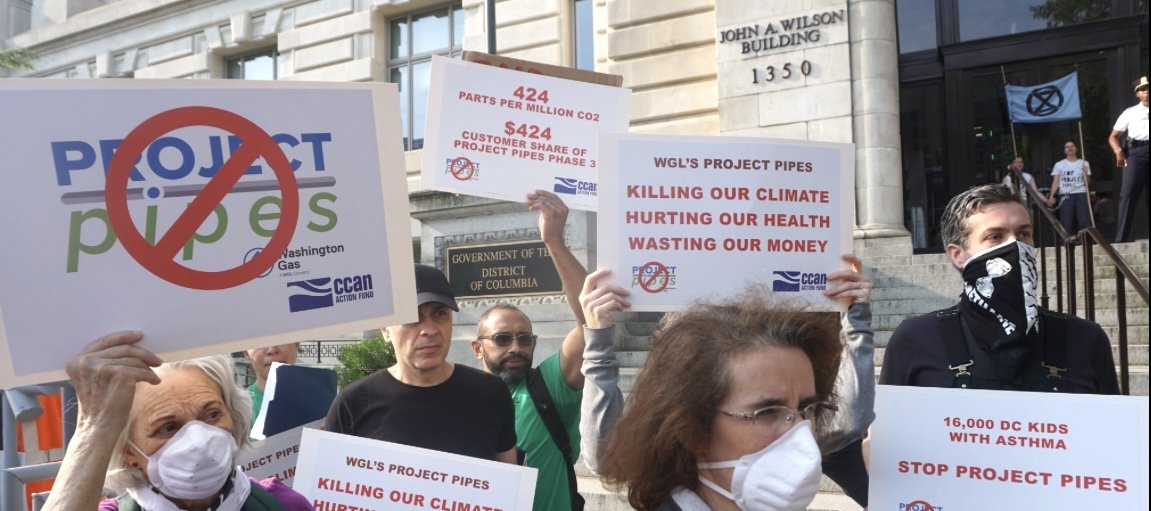Don’t let Washington Gas threaten your health.
New research shows gas appliances emit more benzene -- a carcinogen associated with leukemia -- than secondhand smoke. After testing hundreds of kitchens across the D.C. region for nitrogen dioxide (NO₂), the Beyond Gas D.C. coalition found that people who live with gas stoves regularly breathe indoor air pollution levels higher than the EPA deems safe.
Indoor air pollution can exacerbate chronic health conditions like asthma and chronic obstructive pulmonary disease (COPD), and it puts the health of vulnerable residents like children and seniors at risk. In fact, nationwide gas stove pollution is attributed to 12.7% of childhood asthma cases.
Fossil fuel heating equipment in our homes emits nitrogen oxides (NOx), which drive ozone pollution (also called smog) outdoors and is responsible for one million premature deaths per year globally. Fossil fuel use is also the cause of the greenhouse gas pollution that is overheating our climate and causing extreme weather to get even worse.
Washington Gas wants D.C. residents to keep paying for its dirty, expensive fossil fuels by standing in the way of solutions that would help people breathe healthier air.
Washington Gas is mismanaging your money to prop up its failing methane gas pipelines.
Washington Gas is trying to spend $12 billion¹ – paid for by surcharges on your energy bills – to cover the cost of maintaining its aging, failing, and explosive fossil fuel system.
¹ The economic consulting firm Synapse Energy Economics found that using a conservative estimate of the upfront cost, up to $12 billion in total costs would be foisted on D.C. residents once debt service and corporate profits are added.
For far too long, D.C. utility regulators refused to investigate Washington Gas, despite growing evidence its $12 billion pipeline is failing to fix dangerous gas leaks. The PSC must launch a full investigation to determine the future of gas in D.C.
Why is Washington Gas lobbying hard to keep raising costs? To pad the pockets of its executives and lock District residents into decades of reliance on this dirty, costly energy source at the expense of our wallets, our health, and our climate.
We can’t afford to prop up Washington Gas’ failing gas pipeline network. At a time when D.C. residents are struggling to afford basic necessities such as housing, childcare, and groceries, they shouldn’t be on the hook for higher utility bills because of Washington Gas’ reckless spending. The D.C. Public Service Commission can provide relief to consumers by fully rejecting the hundreds of millions in extra costs for Washington Gas’ over-budget, broken pipeline replacement program.
Half of D.C.’s low-income residents are energy burdened, meaning they pay more than 6% of their income on energy. Washington Gas wants to charge more.
Tell D.C.'s utility regulators: It’s time to protect people, not profits.
Washington Gas is failing to properly address gas leaks.
According to new data, Grade 1 ‘explosive’ gas leaks have increased 40% from 2014 to 2022, even as Washington Gas spends hundreds of millions to cover pipeline replacement costs.
As Washington Gas seeks to balloon costs to D.C. residents to $12 billion, dangerous gas leaks are up – putting residents at risk.
In 2022, neighborhood researchers found nearly 400 active methane gas leaks from Washington Gas’ system across all eight wards of D.C. This survey backed up a report by the DOEE that found 3,346 leaks across the District.
Washington Gas’ aging system is fueling the climate crisis.
Washington Gas’ outdated methane gas pipelines are responsible for 22% of D.C.’s greenhouse gas emissions.
Climate change is driving up temperatures in the D.C. region and summer keeps starting earlier, increasing the risk of health impacts from extreme heat, increasing the risk of flash flooding, and causing waters to rise in the Tidal Basin.
By 2060, D.C. is expected to see 53 days over 90 degrees Fahrenheit, a 76% increase from today. But Washington Gas is trying to lock us into even more dependence on fossil fuels causing the climate crisis and more frequent hot days.
The impacts of climate change in D.C. are not felt equally. Communities of color and low-income communities that have faced decades of disinvestment often are exposed to heat island effects and are at a higher risk of frequent flooding, putting their safety at risk and driving up costs further.
We can’t afford to continue delaying action as the District experiences the impacts of climate change firsthand, yet Washington Gas continues to stand in the way of solutions that will cut our emissions, lower our bills, and clean up our air.








